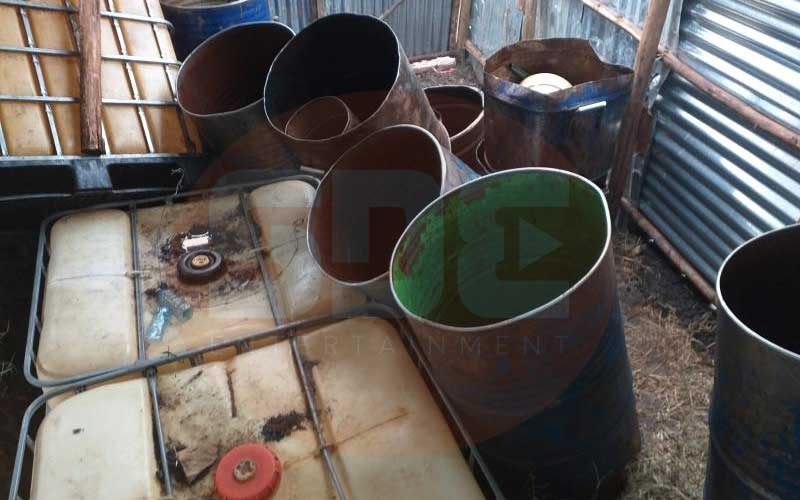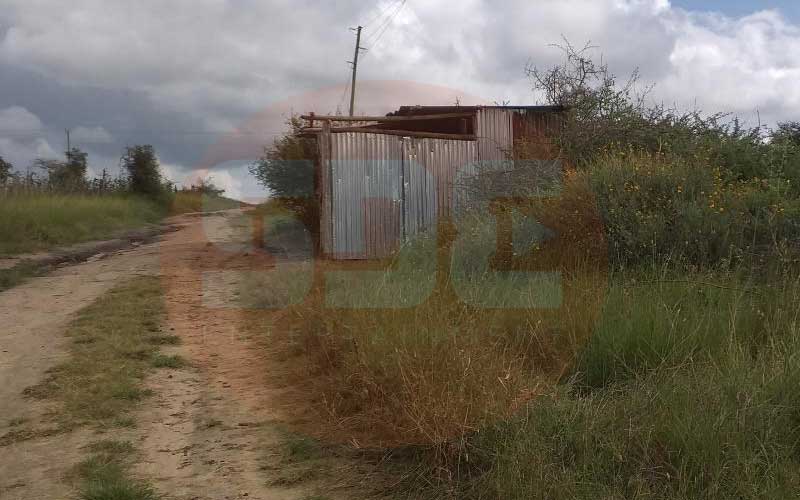
Residents of areas around Konza City are staring at a calamity following the widespread sale of stolen fuel from backyards.
A fire could easily wipe out an entire neighbourhood, as the illegal trade in highly flammable products dispensed from plastic water tanks and metallic drums runs unabated.
For months now, a syndicate siphons fuel from trucks ferrying various petroleum products loaded at the nearby Kenya Pipeline depot, and feeds the thriving trade.
The depot is about four kilometres from the highway, along a dirt road, which has helped the crooks. While they work outside the purview of the authorities, some officials could be part of the scheme.
Tens of homesteads have now been turned into filling stations.
Mainstream market
The bulk of the fuel that is not sold to motorists and boda boda riders finds its way into the mainstream market, mainly through independent dealers.
The syndicate works by diverting up to 400 litres (two drums) per truck to informal traders. Such losses tend to be recovered from retail pricing.
Ordinarily, however, losing 400 litres from a single truck consistently should raise eyebrows among the owners of the fuel.
The theft forms part of a wider scheme to defraud consumers as dealers are allowed to claim compensation for fuel that is lost while in transit.
One trader who identified himself to The Standard as Bryan, said together with others in the syndicate, he could deliver up to 5,000 litres of fuel within a week.
“For that amount of fuel, you can give us until the weekend,” he said.
At the price of Sh80 per litre, this stolen fuel comes at a deep discount when compared to the current retail price of Sh110 for petrol.
Bryan’s depot is one of the tens along the four-kilometre stretch linking the Konza depot to Mombasa Road.
The siphoning from fuel tankers comes after an elaborate network of crooks who regularly punctured the area’s new pipeline to steal petrol, kerosene and diesel was crashed following the government’s intervention last year.
Several arrests have since been made, with investigations establishing that employees of Kenya Pipeline Company had a hand in the abetting of the theft. It was also found that an illegal connection may have been installed during construction.
With the tapping of the pipeline seemingly contained, the focus now shifts to the dangerous sale of fuel within households.
In one such homestead at Kautandini Market, off Mombasa Road, The Standard team found a boda boda rider refilling at a makeshift tin-walled structure that shares a wall with a house.
Given it is an ordinary motorbike, the fuel in question is petrol, which evaporates into fumes if left open under regular daytime temperatures.
It is thought that the motivation behind these customers taking such huge risks is the small savings they make. There are proper filling stations less than a kilometre away from this makeshift one.
Small savings
A local who acted as a source in this investigation provided the elaborate details of how some truck drivers had formed a network that is helping the trade flourish, with little regard to the dangers involved.
“Almost every truck leaving the main depot is diverted into the bushes along the dirt road, and at least one drum of fuel tapped,” said the source, who has close relations with some of the perpetrators.
At one of the illegal collection points, which was not manned when we visited, we discovered six empty metallic drums and three plastic water tanks, each with a capacity of 1,000 litres.
On the outside were fresh tracks of a truck that may have collected siphoned products moments earlier or dropped off the containers for filling up.

This particular depot is built outside a homestead, possibly to avert chances of a disaster, though it is not far enough to be safe should a fire break out.
And at yet another homestead that is directly opposite a secondary school, there were tyre marks from trucks. Our source confirmed that it harboured an illegal depot.
When fuel collections are sufficient, the drums are picked up and stored at a shop in Malili town for onward sale when the inventory can fill up a truck.
This gives an indication of the scale of the dangerous and illegal black market.
Pavel Oimeke, the director-general of the Energy and Petroleum Regulatory Authority, confirmed that there were cases of siphoning from trucks, but deflated it as small scale.
“What I am aware of is the siphoning of small quantities by truck drivers, but we are working with the police to arrest those involved,” he said.
 The Standard Group Plc is a multi-media organization with investments in media
platforms spanning newspaper print
operations, television, radio broadcasting, digital and online services. The
Standard Group is recognized as a
leading multi-media house in Kenya with a key influence in matters of national and
international interest.
The Standard Group Plc is a multi-media organization with investments in media
platforms spanning newspaper print
operations, television, radio broadcasting, digital and online services. The
Standard Group is recognized as a
leading multi-media house in Kenya with a key influence in matters of national and
international interest.



